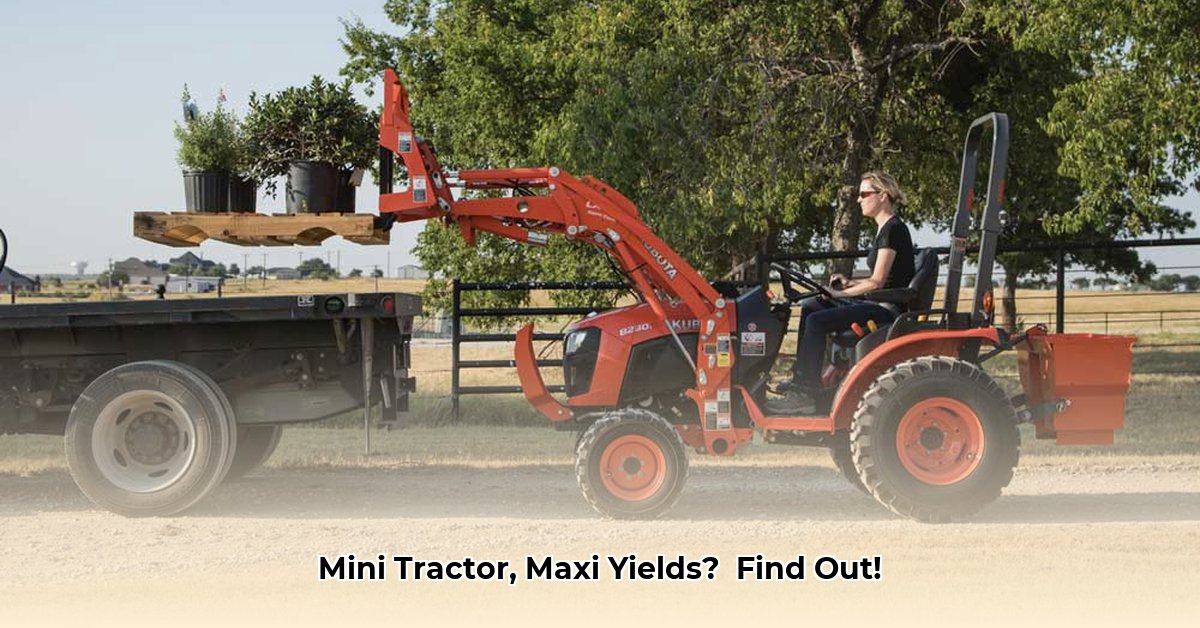
Kubota Tractor Mini: Small Tractor, Big Impact on Sustainable Farming
Farming demands long hours and hard work. But what if you could increase efficiency, lessen your environmental footprint, and even enhance enjoyment? A Kubota mini tractor might be the answer. These compact machines offer significant potential for sustainable agriculture. For more information on toy models, check out this Kubota toy site.
Size Matters: Why Small is Mighty for Sustainable Farming
The Kubota mini's compact size isn't just about convenience; it's key to sustainable practices. Lighter weight means less soil compaction, leading to better drainage, healthier soil, and ultimately, improved crop yields. This is particularly beneficial for smaller farms employing no-till farming. Their agility allows easy maneuverability between crop rows, a crucial advantage for crop rotation and intercropping – both vital sustainable techniques. How can improved soil health directly influence your farm's profitability? Studies show reduced compaction increases yields by an average of 5-10%, leading to significant cost savings.
Precision Farming: Working Smarter, Not Harder
Modern farming relies on smart techniques. Many Kubota mini tractors offer GPS guidance systems for incredibly accurate planting, spraying, and fertilizing. This precision minimizes waste, reduces environmental impact, and promotes sustainability. Imagine applying fertilizer only where needed – less runoff, less environmental damage. What percentage of fertilizer is typically wasted without precision farming technology? Industry estimates suggest up to 30% of fertilizer is wasted using traditional methods.
Fuel Efficiency: Saving Money and the Planet
Fuel costs weigh heavily on farm budgets. Kubota mini tractors, with their smaller engines, consume considerably less fuel than larger models. This leads to both financial savings and a smaller carbon footprint. How much can fuel costs impact a small farm's annual budget? A recent study indicated that fuel costs can account for 10-15% of annual operating expenses on small farms.
Versatility: A Tractor for All Seasons and Crops
The adaptability of Kubota mini tractors is a significant benefit. A wide range of attachments allows the same machine to handle many tasks throughout the year, from spring tilling to summer haying and fall harvesting. This versatility is perfect for sustainable farms with diverse needs. What are some commonly used attachments for Kubota mini tractors? Popular attachments include tillers, mowers, loaders, and various implements for cultivating and harvesting different crops.
Sustainability Scorecard: Weighing the Pros and Cons
| Advantages | Disadvantages |
|---|---|
| Reduced soil compaction | Higher initial cost compared to some alternatives |
| Improved fuel economy | May require multiple passes for extensive fields |
| Enhanced maneuverability | Lower lifting capacity compared to larger tractors |
| Wide array of attachments | Needs operator training and regular maintenance |
| Precision farming capabilities | Technology may become obsolete over time |
Your Step-by-Step Guide to Getting Started
- Assess Your Needs: Honestly evaluate your farm's operations, land size, and current limitations.
- Research Models: Explore Kubota mini tractor models, considering horsepower, features, attachments, and price. Compare options from different manufacturers.
- Seek Expert Advice: Consult fellow farmers, equipment dealers, and your local agricultural extension service.
- Explore Financing: Investigate financing options, including leasing and potential government subsidies.
- Prioritize Training: Safe and efficient operation requires proper training – this is non-negotiable.
- Develop a Maintenance Plan: Regular maintenance is crucial for longevity and optimal performance.
The Kubota mini tractor offers a powerful blend of efficiency, environmental consciousness, and cost-effectiveness. It can significantly boost farm productivity, but careful planning is essential. Thoroughly assess your needs and explore options before investing. Sustainable farming is a continuous process, not a destination.
How to Minimize Greenhouse Gas Emissions from Compact Tractors in Sustainable Farming
Compact tractors like the Kubota mini are gaining popularity in sustainable agriculture, but minimizing their environmental impact is crucial.
Fuel Efficiency: The Key to Lower Emissions
Improving fuel economy is paramount for reducing emissions.
- Regular Maintenance: Routine service, including clean air filters and properly inflated tires, is vital for fuel efficiency.
- Optimal Operation: Gentle acceleration, consistent speeds, and efficient route planning improve fuel consumption.
- Appropriate Implements: Matching implement size to the tractor's horsepower prevents overloading and needless fuel waste.
Precision Farming: Doing More with Less
Precision farming significantly reduces environmental impact.
- GPS Guidance: Accurate operation minimizes overlaps and fuel waste.
- Variable Rate Technology (VRT): Targeted application of inputs based on field-specific needs optimizes resource use.
Alternative Fuels: Exploring the Future
Alternative fuels offer significant emission reduction potential.
- Biodiesel: A renewable fuel source that reduces greenhouse gas emissions.
- Electric Tractors: While requiring a larger initial investment, electric tractors offer long-term environmental advantages.
Beyond the Tractor: A Holistic Approach
Sustainable farming involves a comprehensive strategy.
- Soil Health: Practices like cover cropping and no-till farming enhance soil health, store carbon, and reduce chemical input needs.
- Crop Rotation: Maintains soil health and reduces the need for synthetic fertilizers.
- Integrated Pest Management (IPM): Prevents pest issues while minimizing environmental impact.
Choosing a Kubota mini tractor can be a step towards improving your farm's sustainability. However, remember that a holistic approach, integrating best practices beyond the tractor itself, is crucial for long-term success and environmental responsibility.